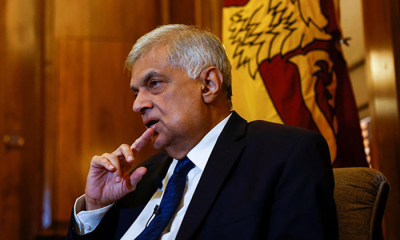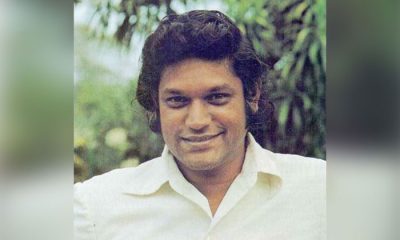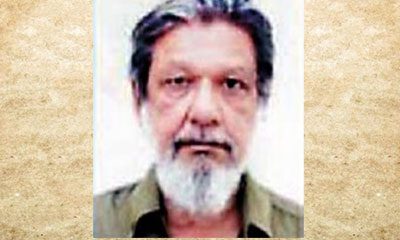Editorial
When great oaks fall

Monday 13rd November, 2023
Anyone’s death diminishes us. However, with apologies to Donne, we are diminished beyond measure when the veterans of the fourth estate depart. On Saturday (11), former editor of The Island Gamini Weerakoon crossed the Great Divide. His funeral took place yesterday. Our readers may recall the pivotal role he played in steering this newspaper through turbulent times, when independent journalism was a sufficient death warrant, demonstrating as he did his intrepidity and sangfroid.
Fondly known as Gamma to his fellow scribes, Weerakoon left Lake House in the early 1980s to join the team Upali Wijewardene handpicked to launch The Island. He played a key role in crafting a new brand of journalism, which quickly gained immense popularity. He succeeded Vijitha Yapa as the editor, and his was a memorably long innings in journalism. He elevated the quality and effectiveness of Sri Lankan journalism and inspired others to strive for similar levels of achievement.
Gamma excelled in editorial writing. He wrote beautifully, forcefully, and persuasively, and his no-holds-barred editorials were simply out of this world; they were loaded with facts and figures, which he clinically analysed with wit and humour thrown in for good measure; they contained very powerful messages that naturally made the conceited rulers of the day furious. The Island became a marked target as a result.
The Island came into being during an era when social media and independent radio/television news bulletins were unheard of. Dictatorial governments were determined to suppress the people’s right to information by muzzling the newspapers that refused to toe their line. The Opposition was too weak to act as an effective countervailing force against the repressive governments which unflinchingly resorted to unbridled political violence and election rigging; and the independent newspapers had to go above and beyond the call of duty to safeguard the interests of the public.
The Island bore the brunt of the fury of violent politicians who acted with impunity, but Gamma was not deterred. He would harden under pressure as all good journalists usually do. He together with his Divaina counterpart, Edmund Ranasinghe, and others of their calibre at UNL formed a band of typewriter guerrillas, as it were, to take on powerful governments, terrorist outfits and other evil forces. It was not occasionally that Gamma had a brush with those in authority. He had the pugnacity of a pugilist, and readily pitted himself against the pompous moneybags and self-important politicians, but he was a kind-hearted gentleman, whose integrity was never in question.
Having cut his teeth on journalism during the hot metal printing days, Gamma shepherded The Island into the digital age. He was a multifaceted personality, and his interests were numerous although he basically confined himself to international affairs, politics and economics, as a prolific writer.
He was one of the well-informed Asian editors who realised the importance of cooperation among newspapers in the region and the need to present news and views about Asia from the Asian perspective in a world dominated by western media agendas; to achieve that end, they founded the Asia News Network (ANN), which began as an association of nine media titles in 1999 but has grown to include 22 members based in the Asian capitals. The Island is the Sri Lankan partner of ANN. Gamma was also one of the founding members of the Editors’ Guild of Sri Lanka. He tenaciously campaigned for media freedom.
Gamma did not officially label himself as a media trainer but he mentored quite a few journalists during his UNL days, and many of them have joined other publications or pursued careers in media-related fields.Veteran scribes who have been enriching journalism for decades are like great oaks that leave lasting voids when they fall. Gamma was unarguably one of them.
Editorial
PC polls: A bid to exploit Ditwah impact?

Tuesday 10th February, 2026
The Opposition has accused the government of seeking to exploit the impact of Cyclone Ditwah to postpone the much-delayed Provincial Council (PC) elections. It has challenged the JVP-led NPP to hold the PC polls immediately. Pivithuru Hela Urumaya leader and former minister Udaya Gammanpila told the media yesterday that the government was all out to avoid an electoral contest on some pretext or another because its vote share had dropped drastically, according to a recent survey.
The government’s approval rating must be decreasing. Otherwise, it would have amended the PC Elections Act promptly and held the PC polls under the Proportional Representation system. However, this does not mean that the Opposition is ready for an election and in a position to turn the tables on the government. Both the government and the Opposition are afraid of facing an election any time soon.
It amounts to a blatant subversion of democracy for a government to meddle with the country’s election calendar. Elections must not be advanced or postponed to suit anyone’s political agenda. Ideally, there should be midterms, which help gauge public perception of the performance of a government. The PC polls are expected to act as a referendum on the incumbent administration’s performance.
It is only wishful thinking that a government can win elections by postponing them. A poll postponement is counterproductive in that it causes public anger to well up and find expression in massive protest votes resulting in electoral anomalies, such as the return of corrupt politicians to power or huge majorities for untested political entities. One may recall that in 1977, the SLFP-led United Front government suffered a crushing defeat after postponing a general election. The UNP won an unprecedented five-sixths majority in Parliament. The SLFP could not make a comeback for 17 long years. The second term of President Jayewardene, who retained the UNP’s steamroller majority by replacing a general election due in 1982 with a heavily rigged referendum, became a disaster. The UNP-led Yahapalana government also postponed the Provincial Council elections in 2017, unable to face them, but lost the 2018 local government (LG) polls and collapsed the following year. President Gotabaya Rajapaksa also blundered by postponing the LG polls in 2022. If he had mustered the courage to hold them, the SLPP would have lost, but the people would have canalised their pent-up anger in the form of a protest vote, and the SLPP government would have been able to make a course correction. President Ranil Wickremesinghe made the same mistake the following year. Neither the SLPP nor the UNP could avoid electoral disasters by postponing the LG polls.
The NPP government finds itself in a dilemma. It has suffered a string of defeats in cooperative society elections, which the main political parties have turned into shows of strength. The LG election results did not meet the NPP’s expectations, which were extremely high. It emerged the winner, but failed to arrest a drop in its vote share and bag a considerable number of hung councils where it secured pluralities. There has been an erosion of its support base, with some powerful state sector trade unions turning against the government. The NPP would not have been in this predicament if it had held the PC polls early last year, when its popularity was high, and the Opposition was in total disarray. Its strategists should be blamed for missing that opportunity.
The government cannot go on postponing the PC polls indefinitely. It has to grasp the nettle. It is lucky that its political rivals are equally wary of facing an election, and have therefore stopped short of cranking up pressure on it to hold the PC elections. Their campaign against the postponement of the PC election is all sizzle and no steak, a wag says.
Editorial
The JRJ syndrome

Monday 9th February, 2026
Politicians cannot bring themselves to let go of power after savouring it and do everything possible to retain their hold thereon. This may explain why excessive powers vested in the executive presidency, draconian laws such as the Prevention of Terrorism Act (PTA), and the misuse of Emergency regulations have survived successive governments led by self-righteous leaders who promised to protect democracy during election campaigns. Only President J. R. Jayewardene (JRJ) made no bones about his dictatorial intentions.
The incumbent dispensation has failed to be different from the previous governments which misused emergency regulations to further their political interests. On Friday (06), Parliament voted to extend a state of emergency, declared by President Anura Kumara Dissanayake in the aftermath of Cyclone Ditwah about two months ago. The Opposition let out a howl of protest, claiming that the JVP-NPP government kept on extending a state of emergency with an ulterior motive—suppressing democratic dissent.
On Friday, the government frontbenchers took great pains to have the public believe that the Opposition was seeing ‘more devils than vast hell can hold’ when it claimed the extension of the state of emergency was aimed at suppressing democracy. However, the Opposition’s arguments were tenable. Arguing that there was no need for emergency regulations for the ongoing relief and rebuilding programmes to be carried out, Opposition Leader Sajith Premadasa said that instead of extending the state of emergency, the government should amend the Disaster Management Act and create a new Ministry for Disaster Management. This is a cogent argument. The government’s disaster preparedness left much to be desired in November 2025. Sri Lanka is among the countries badly affected by the extreme weather events related to climate change, and the government must urgently set up a separate ministry for disaster management and give the existing disaster management laws stronger teeth.
Ironically, most of those who are berating the current administration for misusing emergency regulations had no qualms about doing so while in power. Only a snake will know the tracks of another snake, as a local saying goes. So, one should take serious note of what ‘snakes’ say about each other when they clash on the Diyawanna lakeshore.
There is no way the government can justify its decision to overuse emergency regulations by claiming that the call for declaring a state of emergency came from the Opposition in the immediate aftermath of Cyclone Ditwah.
President Dissanayake has declared that there will be no pay hikes until 2027, regardless of what trade unions may do to pressure his government. The emergency regulations which can be used to suppress workers’ right to strike should be viewed against President Dissanayake’s aforesaid statement which, in our book, is a warning. The government has resorted to brinkmanship in dealing with protesting doctors who have threatened to intensify their ongoing trade union action. Pro-government groups are astroturfing as ordinary citizens and calling for tough action to force the state sector trade unions into submission. Deputy Minister of Public Security Sunil Watagala has asked the police to use emergency regulations to deal with those who carry out what he describes as personal attacks on the President and the ministers. The Human Rights Commission of Sri Lanka has reportedly expressed serious concern over growing threats to freedom of expression in the country, particularly the targeting of journalists through police investigations into instances of alleged defamation.
Meanwhile, arrests are still made under the PTA, which the JVP-led NPP, in the run-up to the 2024 elections, pledged to abolish. It promised “the abolition of all oppressive acts including the Prevention of Terrorism Act and ensuring civil rights of people in all parts of the country”(NPP Policy Framework, A Thriving Nation: A beautiful Life, p. 129). Time was when Dissanayake, as an Opposition MP, waxed eloquent in Parliament, condemning governments for overusing emergency regulations.
All Executive Presidents, except D. B. Wijetunga, have been affected by what may be described as the JRJ syndrome, which drives the wielders of the presidency to arrogate to themselves the powers of vital state institutions and subjugate everything to the interests of their political parties. No surprise that President Dissanayake now has emergency regulations extended on some pretext or another. Besides, he travels by helicopter, and two choppers are deployed in tandem for his journeys even though he once condemned his predecessors for that practice, sarcastically asking whether a President could jump from one helicopter to another in midair in case of an emergency. This kind of behaviour exemplifies the popular local saying: “A water monitor (kabaragoya) becomes a land monitor (thalagoya) when one wants to eat it.”
Editorial
Towering deathtraps?

Many post-disaster rebuilding projects have got underway, and the government is grappling with the uphill task of relocating the survivors of landslides and ensuring the safety of others living in unstable mountainous areas. Experts have warned that if another spell of torrential rains occurs soon, it may trigger a fresh wave of landslides. While efforts are being made to relocate the disaster victims to safe locations, hundreds of apartment dwellers in Colombo are expressing concern about their safety.
A seven-year-old child died on Thursday when a chunk of plaster of an apartment wall fell on him in Colombo 15. He was accompanying his grandmother when tragedy struck. Residents of the multi-storeyed apartment complex, Randiya Uyana, have told the media that they had informed the Urban Development Authority (UDA) several times that the plaster of some apartment walls had developed cracks, posing a danger to them, but their complaints and warnings had gone unheeded. There is a prima facie case of criminal negligence, we reckon.
Besides plaster fissures, what look like structural cracks on concrete beams are visible in some images of the apartment building shown on television. They must be carefully examined forthwith, and immediate action taken if they are symptomatic of any issues compromising the structural robustness of the building. Some residents are heard saying in videos in the digital realm that while they were living in slums and shanties in low-lying areas, they had to worry about only floods once in a way, but now they have to live in eternal fear of being crushed by falling fragments of their apartment building, which is already in a very poor condition due to lack of maintenance; elevators are out of order and sewage systems are malfunctioning. Drug addicts have reportedly damaged the elevators. There is a pressing need for the place to be policed regularly.
City planners have apparently not paid much attention to the social aspects of relocating low-income groups. Densification does not mean vertical relocation of slums and shanties in permanent buildings, so to speak. It is doubtful whether the UDA and other state institutions responsible for the densification projects devised ways and means of overcoming the challenges of transitioning from informal settlements to high-rise housing and the relocation-induced social strain. This may be one of the reasons why we are witnessing the so-called high-rise resettlement failure. Support of urban sociologists and other experts need to be enlisted to address these issues. Action must be taken to tackle the post-relocation integration problems and improve the living conditions of the occupants and ensure that they adapt to their new environment while engineering experts are tasked with ensuring that apartment complexes do not end up being towering deathtraps.
Minister of Transport, Highways and Urban Development Bimal Rathnayake said in Parliament on Thursday that the construction of the Randiya Uyana apartment complex had commenced in 2014. Thus, the building is relatively new, and this fact points to a possible lack of compliance with building standards on the part of the constructor, and other construction issues. Inspections must be conducted urgently to rule out structural load-bearing deficiencies and ensure the safety of hundreds of occupants. The constructor of the building must be questioned. Sri Lanka is no stranger to shoddy constructions, which are ubiquitous.
The UDA ought to learn from apartment complex disasters that have dominated the global headlines during the past several decades and take precautions. Prominent among them was the partial collapse of the Champlain Towers, Florida, where nearly 100 people died in 2021. Experts identified the deterioration of reinforced concrete and corrosion of critical support elements as some of the causative factors, according to media reports. Dozens of people perished when an apartment complex collapsed in Italy in 1999 due to structural failure caused by the use of substandard building materials and poor workmanship. There have been several other such disasters the world over.
One can only hope that proper construction practices and building codes were adhered to when multi-storeyed apartment complexes were constructed, and the UDA will inspect the Randiya Uyana apartment complex immediately without waiting until another disaster strikes. A thorough investigation is called for because it will not only help figure out what has gone wrong with the construction of the apartment building at issue but also hopefully lead to improvements in building standards and safety protocols aimed at preventing similar tragedies in the future in view of rapid vertical urban development.
-

 Features2 days ago
Features2 days agoMy experience in turning around the Merchant Bank of Sri Lanka (MBSL) – Episode 3
-

 Business3 days ago
Business3 days agoZone24x7 enters 2026 with strong momentum, reinforcing its role as an enterprise AI and automation partner
-

 Business2 days ago
Business2 days agoRemotely conducted Business Forum in Paris attracts reputed French companies
-

 Business2 days ago
Business2 days agoFour runs, a thousand dreams: How a small-town school bowled its way into the record books
-

 Business2 days ago
Business2 days agoComBank and Hayleys Mobility redefine sustainable mobility with flexible leasing solutions
-

 Business3 days ago
Business3 days agoHNB recognized among Top 10 Best Employers of 2025 at the EFC National Best Employer Awards
-

 Business3 days ago
Business3 days agoGREAT 2025–2030: Sri Lanka’s Green ambition meets a grid reality check
-

 Editorial5 days ago
Editorial5 days agoAll’s not well that ends well?























